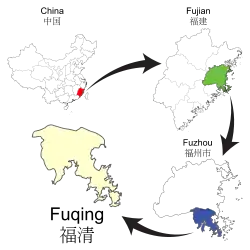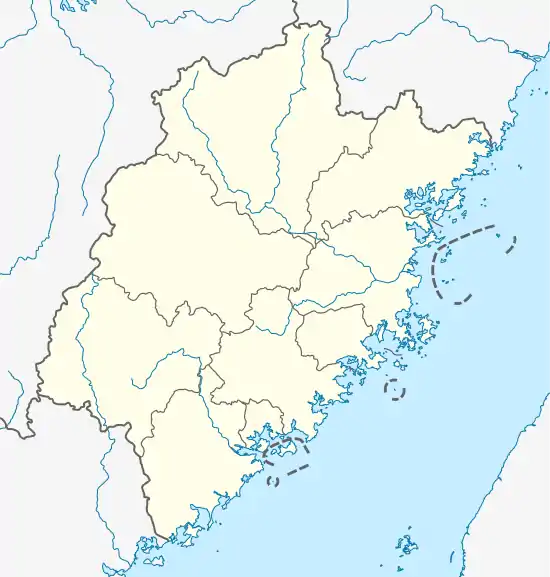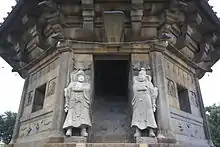Fuqing
![]() Fuqing (Chinese: 福清; pinyin: Fúqīng; Wade–Giles: Fu2-ch'ing1; Pe̍h-ōe-jī: Hok-chhiaⁿ; Foochow Romanized: Hók-chiăng; also romanized as Hokchia) is a county-level city of Fujian Province, China, it is under the administration of the prefecture-level city of Fuzhou.
Fuqing (Chinese: 福清; pinyin: Fúqīng; Wade–Giles: Fu2-ch'ing1; Pe̍h-ōe-jī: Hok-chhiaⁿ; Foochow Romanized: Hók-chiăng; also romanized as Hokchia) is a county-level city of Fujian Province, China, it is under the administration of the prefecture-level city of Fuzhou.
Fuqing
福清市 Futsing | |
|---|---|
 On the Longjiang River in Downtown Fuqing | |
 Location of Fuqing City within Fuzhou City | |
 Fuqing Location of the city centre in Fujian | |
| Coordinates: 25°43′N 119°23′E | |
| Country | People's Republic of China |
| Province | Fujian |
| Prefecture-level city | Fuzhou |
| Population (2018) | |
| • Total | 1,381,000[1] |
| Time zone | UTC+8 (CST) |
| GDP (nominal) | 2018 |
| - Total | ¥110.21 billion ($16 billion) |
| – Per capita | ¥84,105 ($12,709) |
| – Growth | |
| Website | www |
Geography

Fuqing is located in the north-central part of Fujian's sea coast, south of Fuzhou and north of Putian. It has a long indented coast line on the Taiwan Strait, to the south of Fuzhou.
The northern part of the county-level city, including the city's central urban area, is in the valley of the Longjiang River. The southern part includes a number of peninsulas with highly indented coast.
Administrative division
- Yuping Subdistrict (玉屏街道) - city center, and location of the city government
- Longshan Subdistrict (龙山街道)
- Longjiang Subdistrict (龙江街道)
- Yinxi Subdistrict (音西街道) - western part of the main urban area
- Honglu Subdistrict (宏路街道)
- Shizhu Subdistrict (石竹街道)
- Yangxia Subdistrict (阳下街道)
Economy
As of 2018, Fuqing's Nominal GDP was US$16 billion (CN¥110.21 billion), ranked 4th among county-level administrative units in Fujian province; its Nominal GDP per capita was US$11,755 (CN¥81,115).
Industries contribute to GDP for 2017:
| Industry | GDP percentage |
|---|---|
| IT manufacturing (Monitor, TV, and related) | 20.4% |
| Food processing (Grilled Eel, Seafood etc) | 13.4% |
| Pipe and Conduit material | 8.5% |
| Chemical materials | 7.9% |
| Power plant | 4.3% |
| Auto & construction Glass | 3.4% |
| Textile | 3.2% |
| Medicine manufacturing | 1.6% |
| Retail & others | 34.6% |
Total GDP:
| YEAR | GDP Amount |
|---|---|
| 2018 | 110.21B CNY (about $16 billion in USD)[2] |
| 2017 | 99.661B CNY |
| 2016 | 85.921B CNY |
Overseas Fuqing
Fuqing, as well as most of other Fujian, is known for its large number of emigrants, or huaqiao. The first wave of emigration [3][4] started in 1940s; most common destinations during that time were Indonesia, Singapore, and East Malaysia. Despite their humble beginnings, some of them managed to be the richest men in Southeast Asia, e.g. Sudono Salim (Salim Group), Hendra Rahardja, Rachman Halim (Gudang Garam), Henry Kwee Hian Liong (Pontiac Land Group).
Association: International Association of Fuqing, Perkumpulan Fuqing (Indonesia), and Singapore Futsing Association.
Local dialect

Fuqing has its own dialect which is closely related to the Fuzhou dialect, although the two are mutually intelligible to quite a high extent. Since it is a hilly area where mountains used to isolate each village, there are many variations in the local dialects. Most of its people can also speak Mandarin, which is used in schools, businesses, and to communicate with people from different parts of the province. Songs sung in Fuqing dialect are available online.
Regional foods
Fuqing is located in the coastal hills, subtropical climate, warm and rainy, but the river is short and shallow. Rich in species while not rich in harvest. Therefore, the important staple food in Fuqing is sweet potato. Non-staple food is dominated by various marine food. Many traditional snacks are made from sweet potato and seafood.[5]
Guangbing (光饼): Guangbing is a bread product that is baked and shaped like a sesame-seeded burger bun top. In the year of 1562, the Japanese invaded Fujian province. General Qi Jiguang was charged to drive the invaders out of Fujian. In order not to let the meal time slow down their marching speed, General Qi invented a kind of bread which was shaped into a ring at that time, so his soldiers could wear a string of those breads around their neck. After the victory, the recipe of this bread product was spread throughout the province and named Guangbing after General Qi. Nowadays, there is no longer a hole in the center of a Guangbing.
Oyster Patties (海蛎饼):It is made of rice flour (pulp), soya bean powder (pulp), oyster, pork, cabbage and seaweed. It is a kind of fried snacks.[6]
Fish Ball (鱼丸):It is a kind of ball-shaped food. Fish mince made from eels, mackerel or freshwater fish, and sweet potato flour mixture evenly to make its wrappers. The mince of pork or shrimp is inside.[7]
Sweet Potato Ball (番薯丸):The wrapper is made of starch and sweet potato flour. The mince is made of oyster, seaweed and pork. It stands for the family reunion.
Seaweed Cake (紫菜饼):It is made of flour and seaweed by traditional way—Stone oven. Containing various vitamins and microelements that are necessary for humans.
Festival and special customs
Fuqing has some special customs different from other areas in China, which reflects the local history and culture. Fuqing customs have four obvious characteristics:
(1) Inherited the legacy of ancient Yue; (2) Receive a large amount of influence of ancient Central Plains culture; (3) Affected by religion especially the influence of Buddhism and Taoism; (4) In modern times, its absorption of foreign culture [8]
–Spring festival–
Couplets: The couplets stick in spring festival are different from other areas in China. The top region od couplets is white rather than red in Fuqing. Because it is said that In Ming Jiajing forty-one years (1562) New Year’s Eve, when the Japanese invaded Fuqing, people just posted the Spring Festival couplets and they ran away. After Qi Jiguang rate army defeated pirates came back, some people died. Their families and friends changed the couplets into green or added a white top in the red couplets to express mourning. [9]
Coustoms and food:On the first day of the new year, people in Fuqing would eat Xianmian, which is a kind of extra-thin noodles and it means longevity. What’s more, two duck eggs are in the noodles. Because in the local language, the pronunciation of duck egg is similar to suppress chaos, it stands for safe and sound. On the second day of the new year, it is the day to visit and comfort the family that lost their family members last year. Thus, people cannot visit the family where nobody died last year in that day. Otherwise, the visit would be regarded as unlucky.[10]
−The Lantern Festival-
The main customs include eating yuanxiao, dragon and lion dance, Shehuo, lantern riddles, stilt, boat, row, and waking on the li Bridge.[11]
-Winter Solstice festival-
The most important step is making the glutinous rice balls and, prepare the red-orange and ten pairs of chopsticks. The red-orange stands for blessing and ten pairs of chopsticks stand for family reunite. And lighting a pair of red candles, which means thriving.[12]
-Tomb-sweeping Day-
The essential part of the tomb sweeping should be to offer sacrifices that are often made from papers, and fire incense and the firecrackers in front of the tomb. After sweeping the tomb, people would take some pine branches or flowers back home in order to get good luck.[13]
Famous people from Fuqing
- Sudono Salim/Liem Sioe Liong (1916–2012), Indonesian businessman, billionaire. Founder of Salim Group
- Sutanto Djuhar/ Liem Oen Kian (1928–2018), Indonesian and Chinese businessman. President of RongQiao Group
- Cao Dewang (1946-), billionaire businessman, chairman of Fuyao Group, winner of Ernst & Young World Entrepreneur of the Year 2009
- Chen Zhangliang (1961-), Former President of China Agricultural University, vice-governor of Guangxi Province
- Tjoa Ing Hwie (1925-1985), Indonesian businessman, billionaire. Founder of Gudang Garam tbk.
- Goi Seng Hui (1949-), Singapore Businessman, billionaire. Founder of Tee Yih Jia Group.
- Xue Guoqiang (1951-), Lieutenant General for People's Liberation Army of the People's Republic of China
- Oei Wie Gwan Indonesian Businessman, Founder of Djarum Clove Cigarette
- Wang Qingming (1948-), president of All-China Federation of Industry and Commerce
- Han Guolong (1955-), Chinese Businessman, billionaire. Founder of GuanCheng Group.
- Chen Longji (1956-), Chinese Businessman, billionaire. Investor.
- Lin Dingqiang (1965-), Chinese Businessman, billionaire. Owner of Jinhuichina.
- Kiki Barki (1956-), Indonesian Businessman, billionaire. Owner of Harum Energy.
- Liem Toeng Ki/Tukiman Salim (1925-1995), Indonesian Businessman, billionaire, former Owner of Suzuki Motor Indonesia.
- Liem Hariyanto Wijaya Sarwono (1929-), Indonesian Businessman, billionaire. Owner of Bumitama Agri.
- Henry Kwee Hian Liong (?-1988), Indonesian&Singaporean Businessman, Founder of Pontiac Land Group.
- Ye Xianggao (1559–1627), Senior Grand Secretary of the Ming dynasty.
- Ingen Ryūki (1592–1673), founder of the Ōbaku school of Zen Buddhism in Japan.
- Wu Gan (born 1973), human rights activist
- Zheng Xingjuan (born 1989), high jumper
Climate
| Climate data for Fuqing (1981−2010) | |||||||||||||
|---|---|---|---|---|---|---|---|---|---|---|---|---|---|
| Month | Jan | Feb | Mar | Apr | May | Jun | Jul | Aug | Sep | Oct | Nov | Dec | Year |
| Record high °C (°F) | 27.0 (80.6) |
29.3 (84.7) |
29.7 (85.5) |
31.2 (88.2) |
33.0 (91.4) |
35.1 (95.2) |
36.4 (97.5) |
37.2 (99.0) |
37.1 (98.8) |
33.7 (92.7) |
30.8 (87.4) |
27.6 (81.7) |
37.2 (99.0) |
| Average high °C (°F) | 15.1 (59.2) |
15.2 (59.4) |
17.8 (64.0) |
22.3 (72.1) |
26.2 (79.2) |
29.2 (84.6) |
32.3 (90.1) |
32.2 (90.0) |
29.7 (85.5) |
25.9 (78.6) |
21.9 (71.4) |
17.5 (63.5) |
23.8 (74.8) |
| Daily mean °C (°F) | 11.4 (52.5) |
11.6 (52.9) |
13.8 (56.8) |
18.2 (64.8) |
22.5 (72.5) |
25.9 (78.6) |
28.5 (83.3) |
28.4 (83.1) |
26.2 (79.2) |
22.5 (72.5) |
18.4 (65.1) |
13.7 (56.7) |
20.1 (68.2) |
| Average low °C (°F) | 9.0 (48.2) |
9.2 (48.6) |
11.1 (52.0) |
15.3 (59.5) |
19.8 (67.6) |
23.5 (74.3) |
25.8 (78.4) |
25.7 (78.3) |
23.7 (74.7) |
20.0 (68.0) |
16.0 (60.8) |
11.1 (52.0) |
17.5 (63.5) |
| Record low °C (°F) | 0.5 (32.9) |
1.3 (34.3) |
0.3 (32.5) |
6.7 (44.1) |
11.0 (51.8) |
15.9 (60.6) |
20.5 (68.9) |
21.5 (70.7) |
16.0 (60.8) |
10.9 (51.6) |
6.2 (43.2) |
−0.3 (31.5) |
−0.3 (31.5) |
| Average precipitation mm (inches) | 39.8 (1.57) |
81.4 (3.20) |
125.5 (4.94) |
145.3 (5.72) |
179.1 (7.05) |
284.3 (11.19) |
148.1 (5.83) |
233.6 (9.20) |
188.0 (7.40) |
45.0 (1.77) |
37.6 (1.48) |
27.7 (1.09) |
1,535.4 (60.44) |
| Average relative humidity (%) | 72 | 75 | 77 | 78 | 79 | 82 | 79 | 79 | 76 | 71 | 70 | 68 | 76 |
| Source: China Meteorological Data Service Center | |||||||||||||
References
- 福清市政府人口区划
- http://fq.fjsen.com/2019-02/20/content_21994434.htm
- "Archived copy". Archived from the original on 2014-03-05. Retrieved 2013-06-29.CS1 maint: archived copy as title (link)
- http://ericellis.com/archive/chinaos1.htm
- http://news.52fuqing.com/newsshow-1047681.html
- https://www.travelchinaguide.com/cityguides/fujian/fuzhou/dining.htm
- https://www.travelchinaguide.com/cityguides/fujian/fuzhou/dining.htm
- https://wenku.baidu.com/view/27cb7e6eb84ae45c3b358cdb.html
- http://www.fqqxb.com/Article/mswh/200901/181.html
- http://www.360doc.com/content/17/1202/23/50407369_709376148.shtml
- http://www.tech-food.com/kndata/detail/k0195406.htm
- http://www.sohu.com/a/122173019_482304
- http://baijiahao.baidu.com/s?id=1563660998513423&wfr=spider&for=pc
External links
| Wikimedia Commons has media related to Fuqing. |
- https://web.archive.org/web/20090714172241/http://www.fuqing.gov.cn/ - Fuqing Municipal Government